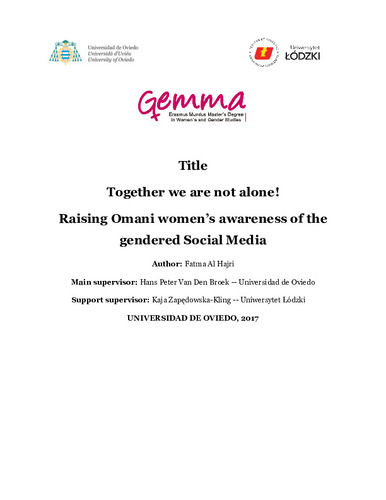Together we are not alone! Raising Omani women’s awareness of the gendered Social Media
Author:
Director:
Subject:
Social network sites
Technology
Gender
Oman
Empowerment
Self-subjectivity
Publication date:
Serie:
Máster Universitario Erasmus Mundus en Estudios de las Mujeres y de Género
Descripción física:
Abstract:
Social network sites (SNSs) such as Instagram, Facebook, twitter, YouTube and many others became a very important part of our daily life. Not to mention, the amount of words that evolved as a result of overusing these sites: for instance, YouTuber, a registered word in Oxford dictionary which is being used to call a person who frequently uses YouTube - an evidence of how much time we spend in SNS. These sites are used for self-presentation and self-disclosure; a user can create a profile where different contents are being shared as well as communicating with other users.Particularly, in Oman - as well as in other Gulf Countries - the last five years witnessed a huge rise in using SNS. However, the way women exist in such spaces is constrained and limited. To understand why, I decided to investigate the relationship between these technologies and gender specifically in Oman society; since this relationship is mutable according to the society it is being constructed in. Therefore, there are two main questions that this research seeks to answer: How do gender relations in Oman shape the social network sites? How is the individual usage of social network sites in Oman reshaping the gender relations? This analysis is grounded in technoscience feminism as a hybrid conceptualization that brings theories of gender and theories of technology together. And it focuses on a mutual shaping constructivist approach that emphasizes the coproduction of socially constructed technology alongside gender. Moreover, such an approach defines the technology neither optimistically nor pessimistically, but highlights both sides and tries to help women in realizing the utopian face of technology and encourages them to use that as empowerment. In-depth, semistructured online interviews have been conducted with ten Omani women, using Skype software application and voice recorder by Microsoft as tools to facilitate the procedure. Half of the interviewees are users, who are consciously or unconsciously submissive to the norms, of social network sites; these interviews will help me to investigate the first research question, identifying the dystopian face of technology. While the other half are public figures who see the utopian face of technology and use it to inspire others and to make change in their lives.
Social network sites (SNSs) such as Instagram, Facebook, twitter, YouTube and many others became a very important part of our daily life. Not to mention, the amount of words that evolved as a result of overusing these sites: for instance, YouTuber, a registered word in Oxford dictionary which is being used to call a person who frequently uses YouTube - an evidence of how much time we spend in SNS. These sites are used for self-presentation and self-disclosure; a user can create a profile where different contents are being shared as well as communicating with other users.Particularly, in Oman - as well as in other Gulf Countries - the last five years witnessed a huge rise in using SNS. However, the way women exist in such spaces is constrained and limited. To understand why, I decided to investigate the relationship between these technologies and gender specifically in Oman society; since this relationship is mutable according to the society it is being constructed in. Therefore, there are two main questions that this research seeks to answer: How do gender relations in Oman shape the social network sites? How is the individual usage of social network sites in Oman reshaping the gender relations? This analysis is grounded in technoscience feminism as a hybrid conceptualization that brings theories of gender and theories of technology together. And it focuses on a mutual shaping constructivist approach that emphasizes the coproduction of socially constructed technology alongside gender. Moreover, such an approach defines the technology neither optimistically nor pessimistically, but highlights both sides and tries to help women in realizing the utopian face of technology and encourages them to use that as empowerment. In-depth, semistructured online interviews have been conducted with ten Omani women, using Skype software application and voice recorder by Microsoft as tools to facilitate the procedure. Half of the interviewees are users, who are consciously or unconsciously submissive to the norms, of social network sites; these interviews will help me to investigate the first research question, identifying the dystopian face of technology. While the other half are public figures who see the utopian face of technology and use it to inspire others and to make change in their lives.
Collections
- Trabajos Fin de Máster [5253]
Files in this item





